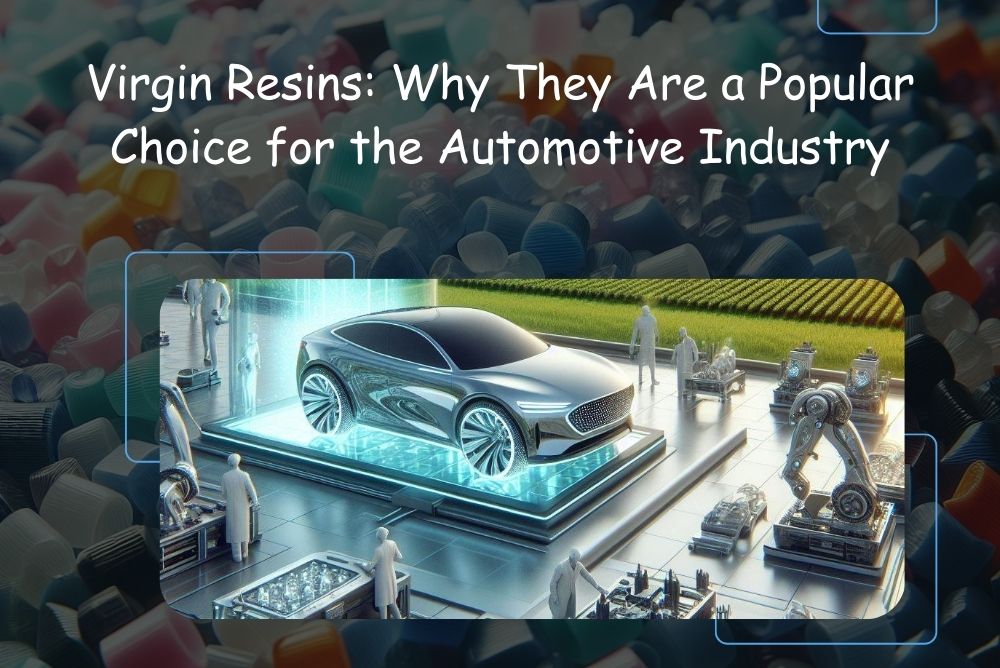
Plastic resins have dramatically reshaped industries by offering material options that rival metals in terms of durability and performance. The automotive sector is no exception. The use of plastic resins has significantly influenced vehicle design, weight management, and performance, among other factors. Among these, thermally-resistant virgin plastic resins stand out due to their exceptional balance of performance, sustainability, and cost-effectiveness. But what exactly makes them so crucial? If you're curious about the significance of virgin resins in the automotive industry, their properties, and their applications, this article dives deep into the subject.
The Essence of Virgin Plastics and Their Driving Forces
Virgin plastic represents the purest form of resin available. As the name implies, it refers to plastic material that has never undergone any prior processing or usage. This resin is derived from natural resources like petrochemical feedstock, crude oil, and natural gas. Virgin plastics have seen a surge in popularity within the automotive industry due to their unmatched durability and structural integrity, which vary based on the specific type of plastic. Commonly used virgin plastic resins include HDPE, LDPE, LLDPE, and polypropylene. The following properties of virgin resins make them particularly appealing to automotive manufacturers:
- Vehicles require components that consistently deliver predictable performance. Virgin resins excel in purity, strength, durability, and resistance to wear and tear, making them ideal for a variety of vehicle parts.
- One of the standout features of virgin resin is its moldability. This allows manufacturers to create intricate designs and complex shapes, which is essential in the automotive industry where aerodynamics, safety, and aesthetics are key considerations.
- Thermal stability is another critical attribute of virgin resins, enabling their use in environments subjected to extreme temperature fluctuations.
Applications Across the Automotive Landscape
Virgin resin finds applications across the automotive spectrum, from interior components to engine bay parts. Here are some common examples:
- Interior Components: Virgin resins are integral to vehicle interiors, including dashboards and seat structures. Their moldability facilitates the creation of designs that are both visually appealing and ergonomic, enhancing the overall driving experience.
- Electrical and Electronic Systems: With the growing integration of advanced electronics in vehicles, virgin resin is employed in the production of casings for electrical and electronic components. Its insulating properties and resistance to electrical conductivity make it a preferred choice for these applications.
- Exterior Body Panels: Known for their durability and lightweight nature, virgin resins are used for exterior body panels. Their ability to withstand road conditions, including impacts and adverse weather, enhances vehicle longevity and safety.
- Safety Features: Virgin resin plays a role in airbag housings and structural components. It maintains structural integrity under stress, contributing to the overall safety performance of modern vehicles.
Innovations and Future Trends
As the automotive industry evolves, technological advancements continue to shape the landscape. The role of virgin plastic resin is expected to expand further as the sector addresses complex challenges and regulatory demands.
- Advanced Formulations: Research efforts are focused on improving virgin resin properties by incorporating additives and reinforcements. This aims to enhance characteristics such as impact resistance, flame retardancy, and UV resistance.
- Sustainability Initiatives: Manufacturers are exploring eco-friendly alternatives to reduce the environmental impact of virgin resin production. Closed-loop systems, where production waste is recycled and reused, are gaining traction.
- Emerging Technologies: As the industry embraces electric and autonomous vehicles, virgin resins will play a pivotal role in addressing the unique demands of these technologies.
Challenges in Adopting Virgin Resins
While integrating virgin plastic resins into the automotive industry holds immense promise, it comes with certain hurdles.
- Cost is a significant factor. Compared to recycled alternatives, virgin resins tend to be more expensive, posing financial challenges for budget-conscious manufacturers.
- Environmental concerns arise from the extraction and processing of fossil fuels, which contribute to pollution and carbon emissions. Navigating these issues is crucial as sustainability becomes increasingly important in the automotive sector.
- Consumer preferences can influence adoption. Many consumers prefer eco-friendly and recycled materials, requiring manufacturers to effectively communicate the benefits and recyclability of virgin resins.
- Regulatory frameworks vary across regions, complicating compliance and consistency in the use of virgin resins globally.
Integrating virgin plastic resins has enhanced vehicle safety and performance while opening new avenues for innovative design. As automotive technology progresses, the role of virgin resins in shaping the industry's future will only grow stronger, driving innovation, efficiency, and more. Whether you're an automaker or a supplier, quality plastic resins are essential for producing superior vehicle components. For premium plastic resins, consult Mid Continent Plastics, a trusted expert in the field. They offer a comprehensive inventory and reliable sourcing across the United States. Reach out to their team to ensure access to the best materials for crafting automotive parts with precision and excellence.
Small Concrete Mixing Plant,Mini Concrete Mixing Plant,Automatic Batching Plant,Concrete Mixing Plant
Zhengzhou XinFeng machinery manufacturing Co. Ltd , https://www.xinfengmachinery.com